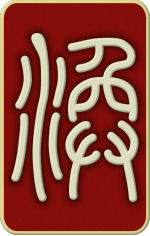
涣 Huàn Dispersion (Scattering) [hexagram 59]


Wind/Wood over Water
 Wood element
Wood element
Lunar month: 6 ; Host (controlling) line : 5
The Descision
Progress and success. The king goes to his ancestral temple. A great journey is advantageous; it is favorable to be steadfast.
‘Progress and success’ – the strong are not hindered and the weak is in its place outside, united in action. ‘The king goes to his ancestral temple’ – occupying the central place. ‘A great journey is advantageous’ – riding in a boat successful.
涣: 亨. 王假有庙, 利涉大川, 利贞. Huàn: hēng. wáng jià yǒu miào, lì shè dà chuān, lì zhēn.
彖传: 涣, 亨. 刚来而不穷, 柔得位乎外而上同. 王假有庙, 王乃在中也.利涉大川, 乘木有功也. Tuàn zhuàn: Huàn, hēng. gāng lái ér bù qióng, róu dé wèi hū wài ér shàng tóng. wáng jià yǒu miào, wáng nǎi zài zhōng yě. lì shè dà chuān, chéng mù yǒu gōng yě.
The Image
Wind over water forms ‘Dispersion’ and so the ancients presented offerings and built temples.
象传: 风行水上, 涣; 先王以享于帝立庙. Xiàng zhuàn: Fēng xíng shuǐ shàng, huàn; xiān wáng yǐ xiǎng yú dì lì miào.
Rescuing a strong horse. Good fortune.
Good fortune of the first ‘six’ is the natural consequence.
初六: 用拯马壮, 吉. Chū liù: yòng zhěng mǎ zhuàng, jí.
象传: 初六之吉, 顺也. Xiàng zhuàn: Chū liù zhī jí, shùn yě.
Scattering then hurrying to help. Regrets disappear.
‘Scattering then hurrying to help’ – securing aspirations.
九二: 涣奔其机, 悔亡. Jiǔ èr: huàn bēn qí jī, huǐ wáng.
象传: 涣奔其机, 得也. Xiàng zhuàn: Huàn bēn qí jī, dé yě.
Dispersing introspection. No regrets.
‘Dispersing introspection’ – considering others not oneself.
六三: 涣其躬, 无悔. Liù sān: huàn qí gōng, wú huǐ.
象传: 涣其躬, 志在外也. Xiàng zhuàn: Huàn qí gōng, zhì zài wài yě.
Scattering the opposing groups leads to great good fortune. Dispersion claims the high ground which is beyond many people’s imagination.
‘Scattering the opposing groups leads to great good fortune’ – both clever and great.
六四: 涣其群, 元吉. 涣有丘, 匪夷所思. Liù sì: huàn qí qún, yuán jí. huàn yǒu qiū, fěi yí suǒ sī.
象传: 涣其群, 元吉; 光大也. Xiàng zhuàn: Huàn qí qún, yuán jí; guāng dà yě.
Shouting out while dispersing like sweat from the body. The stockpiles of food are scattered. No blame.
‘The stockpiles of food are scattered. No blame’ – an appropriate position.
九五: 涣汗其大号, 涣王居, 无咎. Jiǔ wǔ: huàn hàn qí dà hào, huàn wáng jū, wú jiù.
象传: 王居无咎, 正位也. Xiàng zhuàn: Wáng jū wú jiù, zhèng wèi yě.
Blood from wounds disperses and goes away. Anxiety dissipates. No blame.
‘Blood from wounds disperses’ – no risk of further injury.
上九: 涣其血, 去逖出, 无咎. Shàng jiǔ: huàn qí xuè, qù tì chū, wú jiù.
象传: 涣其血, 远害也. Xiàng zhuàn: Huàn qí xuè, yuǎn hài yě.
The full set of 64 English translations is available in our new book 'Book of Changes - Deciphered' ➚.